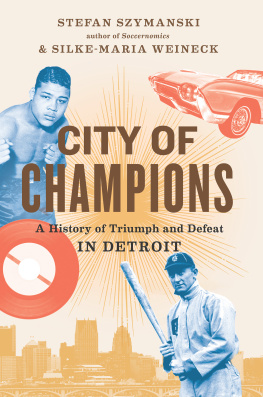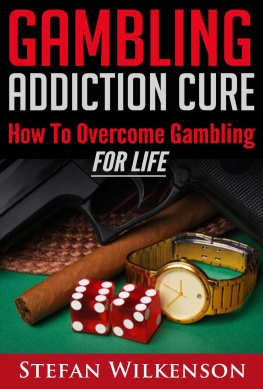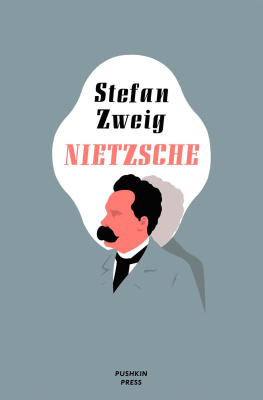Stefan Szymanski - City of Champions
Here you can read online Stefan Szymanski - City of Champions full text of the book (entire story) in english for free. Download pdf and epub, get meaning, cover and reviews about this ebook. year: 2020, publisher: The New Press, genre: Art. Description of the work, (preface) as well as reviews are available. Best literature library LitArk.com created for fans of good reading and offers a wide selection of genres:
Romance novel
Science fiction
Adventure
Detective
Science
History
Home and family
Prose
Art
Politics
Computer
Non-fiction
Religion
Business
Children
Humor
Choose a favorite category and find really read worthwhile books. Enjoy immersion in the world of imagination, feel the emotions of the characters or learn something new for yourself, make an fascinating discovery.
- Book:City of Champions
- Author:
- Publisher:The New Press
- Genre:
- Year:2020
- Rating:3 / 5
- Favourites:Add to favourites
- Your mark:
- 60
- 1
- 2
- 3
- 4
- 5
City of Champions: summary, description and annotation
We offer to read an annotation, description, summary or preface (depends on what the author of the book "City of Champions" wrote himself). If you haven't found the necessary information about the book — write in the comments, we will try to find it.
City of Champions — read online for free the complete book (whole text) full work
Below is the text of the book, divided by pages. System saving the place of the last page read, allows you to conveniently read the book "City of Champions" online for free, without having to search again every time where you left off. Put a bookmark, and you can go to the page where you finished reading at any time.
Font size:
Interval:
Bookmark:

CITY OF CHAMPIONS
Also by Stefan Szymanski
Money and Soccer
Soccernomics
Playbooks and Checkbooks
Fans of the World Unite!
National Pastime
Also by Silke-Maria Weineck
The Tragedy of Fatherhood: King Laius and the
Politics of Paternity in the West
The Abyss Above: Philosophy and Poetic Madness
in Plato, Hlderlin, and Nietzsche
CITY OF CHAMPIONS
A HISTORY OF TRIUMPH AND DEFEAT IN DETROIT
STEFAN SZYMANSKI AND
SILKE-MARIA WEINECK

CONTENTS
.
.
.
.
.
.
.
.
.
.
.
.
.
.
.
.
.
.
.
.
.
.
.
.
.
.
.
.
INTRODUCTION: JANUARY 1, 2020
The Paris of New France, then the Motor City. The Arsenal of Democracy, later Motown. New Fallujah, the Murder Capital, the Comeback City. Detroit has gone by so many names since its founder, Antoine Laumet de la Mothe Cadillac, declared in the early eighteenth century that all nations will come to settle there. They did, and they built what we believe is the most American of American cities, embodying the countrys glory and agony alike.
This book is about Detroit as the City of Champions and its many triumphs and defeats, athletic and otherwise. Sports have a unique power to unify those who have nothing in commonthey are the last mass ritual in a fractured world. Athletic events mark city life and city time. By now, they are the only venues in which a city routinely expresses itself as a city. The Tigers, the Lions, the Red Wings, and the Pistons belong to Detroit before they belong to their owners, and it is not by chance that Joe Louiss fist has become the most recognizable symbol of the city, eclipsing the giant monument known as The Spirit of Detroit.
Sports not only have the power to create community in the moment, to bind people in fleeting experiences of shared pride, exuberant joy, bottomless rage, or crushing disappointmentbe that in Tiger Stadium or the Masonic Temple, where the Detroit Roller Derby league plays. Sports create stories and images that endure long past the event, often centered on legendary figures: Ty Cobb, Charlie Gehringer, Hank Greenberg, Joe Louis, Sugar Ray Robinson, Gordie Howe, Bobby Layne, Dave Bing, Tommy Hearns, Isiah Thomas. This book tells many of these stories, but it is not a book about famous athletes so much as a book about the city that watched them win and lose, and so it tells the citys stories alongside theirs. Our accounts are not meant to be exhaustivethey build on the work of countless historians, journalists, novelists, and other keen observers, and anybody who wants to delve deeper will find references to their books and articles in the notes.
Sports are and have always been a site of struggles that seemingly exceed them. The fact that they bring people together who would otherwise have nothing to say to each other does not mean that they erase the fault lines that run through American public life. No matter how loudly major league owners clamor for political neutralitywhich is simply a particular kind of politics, anywaysports are about race, sports are about money, sports are about gender, infrastructure, violence, aesthetics, class, history, and identity. Sometimes, you can forget about all of that during the game or the fight or the race, but it always comes back: in a citys Olympic bids and the global political forces that doom them, in the anti-Semitic jeers hurled at Hank Greenberg, in Joe Louiss fight against Hitlers favorite boxer, in a city budget that can find money for a stadium but not for heated classrooms, in a womens baseball league that forces its players to wear make-up and slide into base wearing miniskirts.
All cities are mad: but the madness is gallant, the American journalist and novelist Christopher Morley wrote. All cities are beautiful, but the beauty is grim. Detroit can be very grim and very beautiful, quite mad, and so gallant. Just as it rose higher than most cities in the first half of the twentieth century, it fell harder than most in the second half. The times when the Tigers, the Red Wings, and the Lions could nab all the major league championships in a single year are long gone, as are the years when Detroit was one of the richest cities in America. The city that changed the country and the world when it began churning out millions upon millions of cars, the city that made the weapons of war that defeated the Axis powers in 1945 was abandoned after the war, first in a trickle, then a streamabandoned by those who wanted to leave or had no choice in the matter, then abandoned by the country that did little to stem, let alone reverse, its economic decline. Few American cities survived the rise of the suburbs intact, but few were hollowed out as dramatically as Detroit, the first major American city to go into bankruptcy.
And yet, Detroit is still beautiful, still gallant, still ever-changinga city that pulls on your heartstrings, not least because it is a border town, and those always carry a certain ambiguity of belonging. Even Chrysler, in marking its cars imported from Detroit, signaled they were foreign in a way. Of course, there is something of a clich in two Europeans falling in love with the city, picking their favorite team (Detroit City Football Club!), and deciding to write a book about it. Detroit has seen its share of white tourists who marvel and shudder at the industrial ruins and the abandoned homes, grab a fancy meal at Selden Standard, catch a show at the Fox Theatre, pose with The Fist, take a quick ride on the People Mover, and take off again. We have tried very hard not to be those people but to immerse ourselves in the rich, troubling, glorious, multi-layered history of the city, from its earliest days to its ongoing rebirth as the most exciting city in America, to quote the New York Times.
Our chapters are anchored in iconic moments in Detroit sports, but they fan out, as it were, into the life of the city and its people that surrounds these moments and gives them deeper meaning. Sometimes the stories of the sports and stories of the city emerge as closely intertwined, sometimes they run in parallel. Some of the stories speak about victory and conquest, others about defeat and humiliation. Still others are ambivalentsports create community, but they create intense conflict as wellconflict is, after all, the beating heart of competitive sports, and the unbridled emotion they authorize can turn ugly in a heartbeat.
We have chosen to tell these stories in reverse chronological order, so our readers can go back in time, uncovering layer after layer; see patterns emerge; see the city rise and fall and rise again as it hurtles through American history, and as this history hurtles through it in turn. In this regard, the book functions like a palimpsest, where you encounter the most recent and the most familiar stratum of meaning first, going back in time as you discover the older events that shaped what came afterlike an archaeology project that uncovers buried layers of Detroits history, unfamiliar and yet intrinsically linked to the present.
In todays Detroit, the major league teams, whose layered history we touch on again and again, may be struggling a bitbut all over town, smaller enterprises have sprung up, clubs and leagues that belong to their players and their fans and the neighborhoods, not the billionaires. The Detroit Roller Derby league, for instance, and the Detroit City Football Club are not just good fun to watch; they are building community, and they command intense loyalty in return.
Next pageFont size:
Interval:
Bookmark:
Similar books «City of Champions»
Look at similar books to City of Champions. We have selected literature similar in name and meaning in the hope of providing readers with more options to find new, interesting, not yet read works.
Discussion, reviews of the book City of Champions and just readers' own opinions. Leave your comments, write what you think about the work, its meaning or the main characters. Specify what exactly you liked and what you didn't like, and why you think so.








